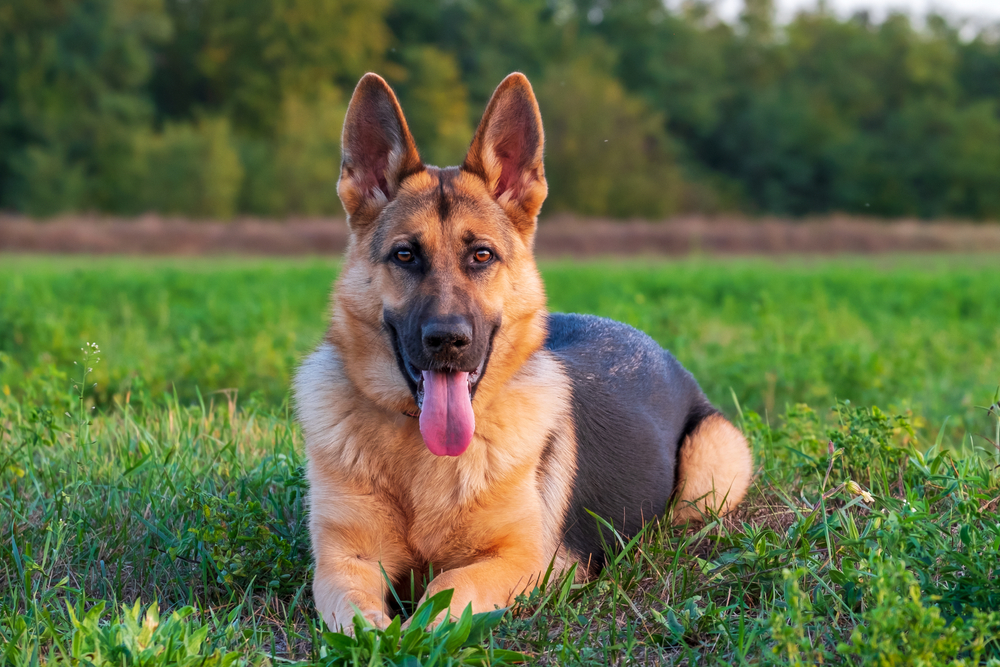Courageous work dogs and faithful companions, German Shepherds have captivated dog lovers for generations. German Shepherds are easily identified by their pointed ears, square head, and long muzzle, along with their bushy tails and mid-length double coat. They also have that unmistakable German Shepherd temperament—part playful, part obedient, all fun.
German Shepherd Average Size and Life Expectancy
- Height: 22-26 inches
- Weight: 50-90 pounds
- Life Span: 9-13 years
German Shepherd Characteristics and Traits
Friendliness
Affectionate with family 5/5
When it comes to these dogs, affectionate is an understatement. German Shepherds are a definitive family dog breed. The German Shepherd’s temperament is loving and loyal, meaning they’ll be waiting to greet you with kisses the moment you walk through the door.
Good with other dogs 3/5
While German Shepherds can get along with other dogs, they’re generally not the biggest fans, unless they’ve been raised together. Their nature makes them defensive, protective, and domineering when it comes to other pups, but with proper socialization, you can teach a German Shepherd to get along with another dog.
Good with children 5/5
Calm and sweet around little ones, there’s a reason so many parents choose German Shepherds as the companions for their young children. This breed loves to spend quality time with family.
Good with strangers 4/5
So long as the stranger appears friendly, German Shepherds are usually eager to make a new acquaintance. Early socialization and interactions with strangers will prime your dog for proper behavior when making human friends.
Adaptability
Adapts well to apartment living 3/5
Surprisingly, this mid-sized breed can still thrive in tight quarters. As long as you provide proper exercise, frequent outings, and plenty of snuggles, your German Shepherd will be content living in a city apartment.
Good for novice owners 2/5
Despite the positives of German Shepherd behaviors, this breed can feel like a lot of work for a first-time dog owner. Frequent shedding, significant exercise requirements, and general neediness might make the task of raising a German Shepherd a little too difficult for inexperienced pet parents.
Sensitivity level 5/5
German Shepherds are partially known for their nervousness. Whether picking up on their owner’s anxiety or feeling frightened by their environment, the high sensitivity level of German Shepherds can take some getting used to and may require special treatment from time to time.
Tolerates being alone 2/5
Like so many dogs, German Shepherds aren’t interested in spending time alone. They much prefer to be by their owner’s side, no matter the situation.
Tolerates cold weather 4/5
A double coat means plenty of protection against extreme cold. In fact, German Shepherds are more prepared than most humans when it comes to weathering cold climates.
Tolerates hot weather 3/5
It may be surprising that a dog that thrives in cold weather can also put up with a little heat. Despite their warm coat, German Shepherds are equipped to handle warm days, so long as they’re given proper access to water and the opportunity to cool down now and again.
Health and Grooming Needs
Shedding level 4/5
These rugged canines are frequent shedders. You can expect year-round shedding from their outer coat, but their inner coat is also completely shed twice a year. Consider investing in a quality vacuum and discovering what shedding tools work best for you and your dog.
Coat grooming frequency 4/5
Due to their frequent shedding, it’s highly recommended that you tackle grooming regularly. Brush your German Shepherd a few times per week and keep up with regular nail clippings. In terms of bathing, it’s only necessary once or twice per year or in situations when your pup has gotten extra dirty.
Drooling level 1/5
A long snout doesn’t mean extra slobber. German Shepherds aren’t prone to drooling unless it’s over their dinner. Otherwise, this breed tends to keep its saliva inside its mouth—where it belongs.
Coat type/length 5/5
German Shepherds sport a luxurious double coat perfect for fall and winter layering. The undercoat is dense and soft, while the top layer, known as the guard coat, is more abrasive and slightly shaggy.
General health 4/5
This breed is generally considered well-rounded in its general health. That said, German Shepherds are genetically predisposed to hip dysplasia, bloat, and arthritis, mostly due to their size.
Potential for weight gain 2/5
German Shepherds prefer to be active and aren’t known to covet their food. Still, it’s easy for a few too many treats and a few too few walks to begin to add some extra weight to your pup. Keep a close eye on their regular diet and exercise to ensure the health benefits of a proper German Shepherd weight.
Size 4/5
While not quite massive, German Shepherds are on the larger side of dog breeds in general. The average German Shepherd height is over 2 feet tall, and the breed is known for its agile and muscular bodies.
Trainability
Easy to train 5/5
Most German Shepherds are eager to learn. Encourage your pup with positive reinforcements and you could see massive behavioral improvements in a few weeks or even days.
Intelligence 5/5
The standard German Shepherd profile usually includes the fact that these are some of the smartest dogs around. Since they were bred as work animals, they’re capable of completing complex tasks and mastering unique commands that few other dog breeds could master.
Prey drive 4/5
Generations of selective breeding have reinforced the German Shepherd’s pray drive. Where they were once prowling the prairies for potential threats to their flock, today they may walk down the street and chase after a fleeing squirrel.
Tendency to Bark/Howl 4/5
German Shepherds are quick to vocalize—not just that, but they have one of the loudest barks on the block. Barking is a natural instinct for them, but with proper training, they can learn to bark only at threats or problems instead of every passing car, squirrel, and gust of wind.
Wanderlust potential 2/5
Home is where the heart is and in your German Shepherd’s case, their heart is with you. That means it’s uncommon for an adult German Shepherd to leave their master’s side for long. You should expect your pooch to stay put and have little interest in exploring the great outdoors without you.
Physical Needs
Energy level 5/5
Put simply, German Shepherds never stop. They were bred for high endurance activity and long hours so keeping up with them is pretty much a full-time job.
Intensity 5/5
You can expect to be just as exhausted as your pet after playtime. German Shepherds give 100 percent every time, which means spending the afternoon with your precious pooch can be a full-body workout depending on your play style of choice.
Exercise needs 5/5
German Shepherds are seriously physical pets. That means plenty of daily exercise is required to keep them in good health and high spirits. While walks are certainly appreciated, running, swimming, and hiking may be what your dog prefers.
Playfulness 5/5
All work and no play? Not so fast. Just because German Shepherds were bred to help with livestock doesn’t mean they’re not eager for a game of fetch or tug of war. Embrace their playful nature by introducing new games to play together.
Mental stimulation 5/5
Because of their high capacity for complex tasks, German Shepherds require regular mental stimulation to feel confident and purposeful. Offer up new ways to challenge your pooch mentally so they don’t get bored.
More About German Shepherd
From the open prairies to the open floor plan of your apartment, German Shepherds are a beloved breed, treasured for their athleticism and intelligence. Don’t be fooled by their hardworking history; these pups have a playful spark matched by few other dogs. German Shepherds have made a serious mark on the world, with stars on Hollywood Boulevard and write-ups in scientific journals, and they continue to find their way into hearts and homes across the country.
For those looking to live a highly active life, German Shepherds make natural companions. Additionally, these dogs are intelligent and sensitive enough to play the role of a beloved family pet, show dog, and best four-legged friend.
As guard dogs, you can expect your German Shepherd to let you know when anyone is near with a hearty bark. More often than not, a German Shepherd is eager to meet a new friend, so long as they don’t upset their sensitive temperament. Perhaps most notably, German Shepherds are attached at the hip to their owners, following them from room to room and always looking to stay close. There’s always more to learn when it comes to living with a German Shepherd, but these multifaceted dogs are as rewarding as they are complex.
German Shepherd History
Unsurprisingly, this breed’s origins can be traced to Germany. Near the end of the 19th century, German Shepherds were used frequently by farmers to herd and protect their livestock. Throughout Germany, these dogs were celebrated workers, though they hadn’t yet earned a proper place as loving companions.
As their reputation grew, so did their popularity. The keen sense of smell, intelligence, and agility associated with German Shepherds led to a country-wide appreciation for the breed by the early 20th century. Simultaneously, the first German Shepherds were transported to America for a new population to appreciate.
In 1907, the first German Shepherd was exhibited in America, and 6 years later, The German Shepherd Dog Club of America was founded. By the beginning of World War II, this breed was working with military personnel on the front lines, and by the end of the war, these dogs became increasingly associated with emergency workers and public service. Besides looking the part, German Shepherds have done a lot to earn their loyal and courageous reputations. Much of German Shepherd history is about how these dogs have helped us through the challenges we’ve faced—what else can we expect from man’s best friend?
German Shepherd Facts
- It’s easy to trace the German Shepherd’s exact origins. The dog breeder Max von Stephanitz named and defined the breed at the turn of the 20th century.
- There are five types of German Shepherds, including the Saddle Back German Shepherd, Black German Shepherd, and White German Shepherd.
- German Shepherds learned to parachute in WW2.
- German Shepherds can run faster than any human on Earth at about 30 miles per hour.
- While most people in the US refer to them as German Shepherds, this breed has also been known as the Alsatian Wolf Dog.
- Two different 1920s doggy stars have their paw prints on the Hollywood Walk of Fame.
What You Need to Know as a German Shepherd Owner
There’s no reason to feel unprepared when adopting and trying to understand German Shepherd behavior. Read on to learn about essential German Shepherd breed info, so you can put your skills to use when caring for your next pup.
German Shepherd Health & Preventative Care
German Shepherds have a predisposition for developing bloat, a condition caused by foam or air in the chest cavity. This build-up can have fatal effects on your pup, so be certain to watch for the early signs of bloat, like retching and swelling in the chest area. Additionally, heavy work can lead to joint pain for your pup so avoid strenuous work until your canine is fully grown.
Recommended Health Tests From the National Breed Club:
- Up-to-date X-rays
- Canine Leukocyte Adhesion Deficiency (CLAD)
- Hyperuricosuria (HUU)
German Shepherd Temperament & Emotional Wellness
German Shepherds are at their happiest when given purpose. Directed play, challenging tasks, and intense exercise can be incredibly fulfilling for this breed. On the other hand, significant time alone can lead to nervousness and serious anxiety.
German Shepherd Environmental
Due to their insulated coat, German Shepherds are equipped for chillier climates, though they’re often equally comfortable in warm weather. Their general flexibility also extends to their home environment, as German Shepherds can make the most of a smaller house or apartment if given proper care.
German Shepherd Exercise & Play
A quick stroll around the block isn’t going to cut it for a German Shepherd. Their ideal day involves at least 2 full hours of rigorous exercise, making them one of the most active dog breeds around. Additionally, German Shepherds appreciate a bit of variety, so try to change up activities and locations as frequently as possible. Your pup will appreciate the extra effort to keep playtime fun.
German Shepherds Behavior & Training
Obedience is one of the words most often associated with German Shepherds, with good reason. You can expect your German Shepherd to obey your commands and take to behavioral training naturally. So long as you back up your training with proper reinforcements—like their favorite tasty treats—you’ll quickly see the results of your efforts.
German Shepherd Nutrition
To lead an active life, German Shepherds need plenty of protein, fat, and calories to provide ample energy. Your German Shepherd might appreciate a low-grain diet, with plenty of premium meat and even probiotics to benefit their gastro-intestinal health. If you’re looking to expand on the standard doggy diet, you should consult with your vet to ensure any supplementary food is beneficial for your pup.
Learn How to Properly Care for Your German Shepherd & Get Nutrition Information from AskVet’s Professional Veterinarians.






